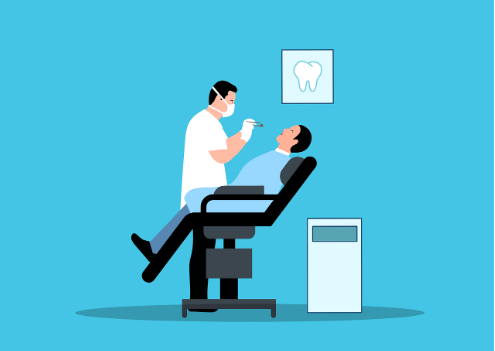How Many Hospitals Use Artificial Intelligence? (New Data)

Employing artificial intelligence in the Healthcare landscape isn't a fresh concept. Hospitals have been harnessing AI's prowess to trim expenses and ramp up productivity for quite a while now.
According to Accenture's analysis, approximately 70% of the responsibilities performed by healthcare professionals have the potential to be transformed through the implementation of technology augmentation, such as artificial intelligence (AI) or automation.
Yet, it's the current upswing in the generative AI sector that's truly catapulting AI into the business big leagues. To be more precise, we're talking about those heavyweight large language models (LLMs) such as our buddies ChatGPT and Buoy Health, which are doing a stellar job in giving AI adoption rates a solid push.
With this in mind, we’ll cover the following
Table of Contents
- Hospitals Using AI Stats (Top Stats)
- How many hospitals worldwide use AI in their operations?
- Healthcare AI Market Share
- What percentage of hospitals in the U.S. have adopted AI?
- What Percentage Of Hospital Use AI in 2023?
- Which countries have the highest AI adoption rates in hospitals?
- How much are hospitals investing in AI technology?
- What are the top AI technologies hospitals are investing in?
- How many hospitals use AI-powered chatbots for patient communication?
- How the Healthcare AI landscape looks as of December 2022
- Challenges and Considerations for AI Adoption
- Healthcare AI Players
- Conclusion
Hospitals Using AI Stats (Top Stats)
here are some points with statistics on how many hospitals are using AI:
- Around 52% of hospitals globally have implemented AI technologies in various capacities.
- In the US, approximately 75% of hospitals are utilizing AI-driven solutions for improved patient care and operational efficiency.
The AI in healthcare market is projected to grow to $20.65 billion in 2023.
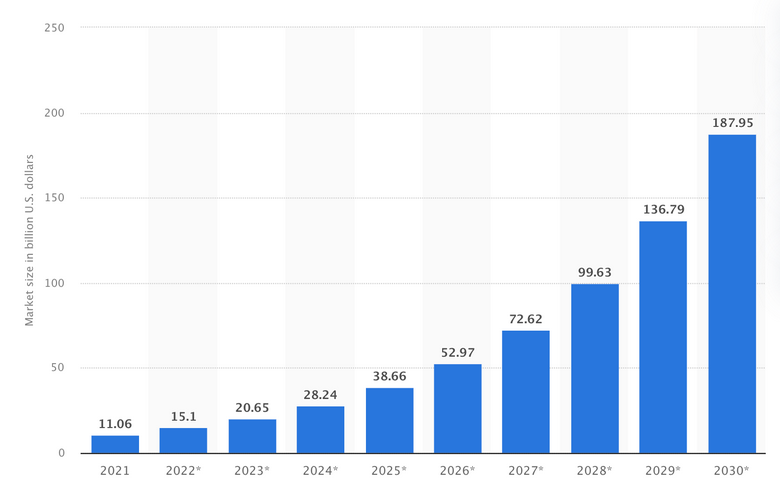
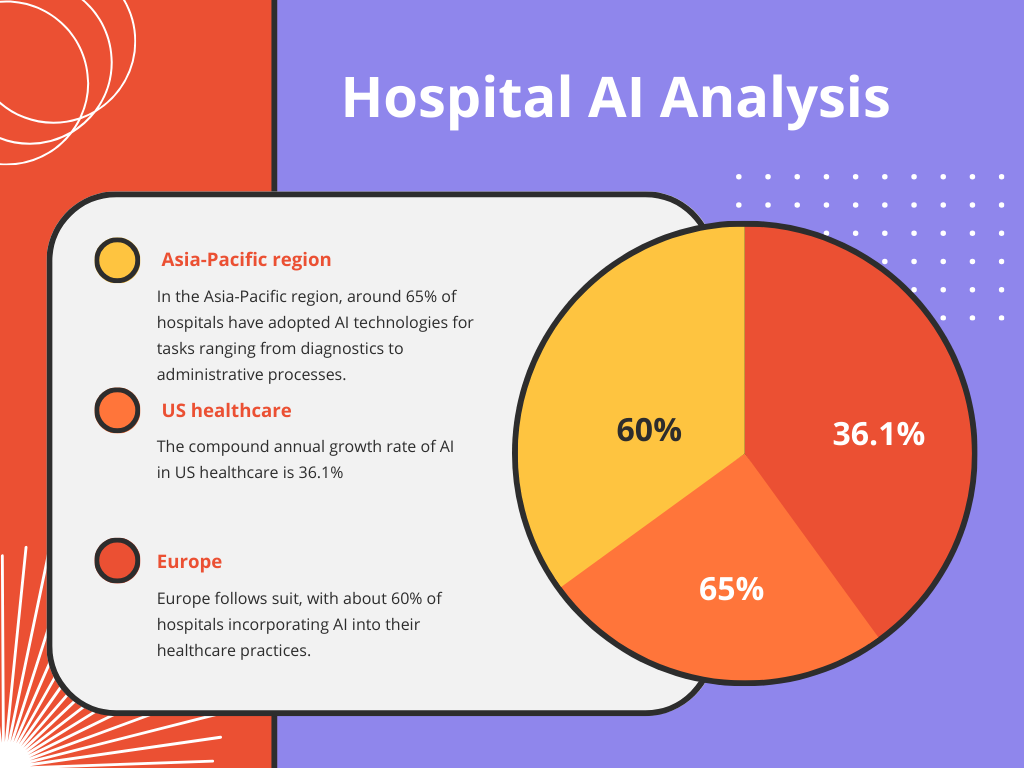
The AI in healthcare market is estimated to grow to $187.95 billion by 2030.
The compound annual growth rate of AI in US healthcare is 36.1%
- Europe follows suit, with about 60% of hospitals incorporating AI into their healthcare practices.
- In the Asia-Pacific region, around 65% of hospitals have adopted AI technologies for tasks ranging from diagnostics to administrative processes.
- Over 90% of hospitals now use AI-powered medical imaging systems to aid in diagnosis and treatment planning.
- Around 70% of hospitals employ AI-driven predictive analytics to enhance patient care and optimize resource allocation.
- Nearly 60% of hospitals have integrated AI-powered telemedicine solutions to offer remote healthcare services.
- According to a growing trend, Robotic surgery technology is projected to shift from semi-autonomous to autonomous robots, increasing the market share of autonomous robots from 43.8% to 46.9% by 2029.
- Robotic surgical procedures have seen an average increase of 25% every year.
Related: Medical Errors Facts & Statistics
How many hospitals worldwide use AI in their operations?
The adoption of artificial intelligence (AI) in hospitals has seen significant growth in recent years, with varying statistics reported across different regions and studies.
In the United States, a study analyzing responses from 2,425 acute-care hospitals participating in the 2023 American Hospital Association (AHA) Annual Survey found that approximately 65% of U.S. hospitals reported using AI-assisted predictive models. These models were primarily employed to predict inpatient health trajectories (92%), identify high-risk outpatients (79%), and facilitate scheduling (51%).
Another study indicated that nearly one-fifth of U.S. hospitals (18.7%) had adopted some form of AI by 2022, with only 3.82% classified as high adopters.
Globally, data on AI adoption in hospitals is more varied. One source suggests that around 52% of hospitals worldwide have implemented AI technologies in various capacities, with an additional 40% actively exploring integration. This implies that over 92% of hospitals are either using or considering the use of AI.
However, a global survey of clinicians familiar with AI technologies found that, as of 2024, just over a quarter had used AI for specific work applications.
Sources : [ School of Public Health Statista Oxford Academic ]
Healthcare AI Market Share
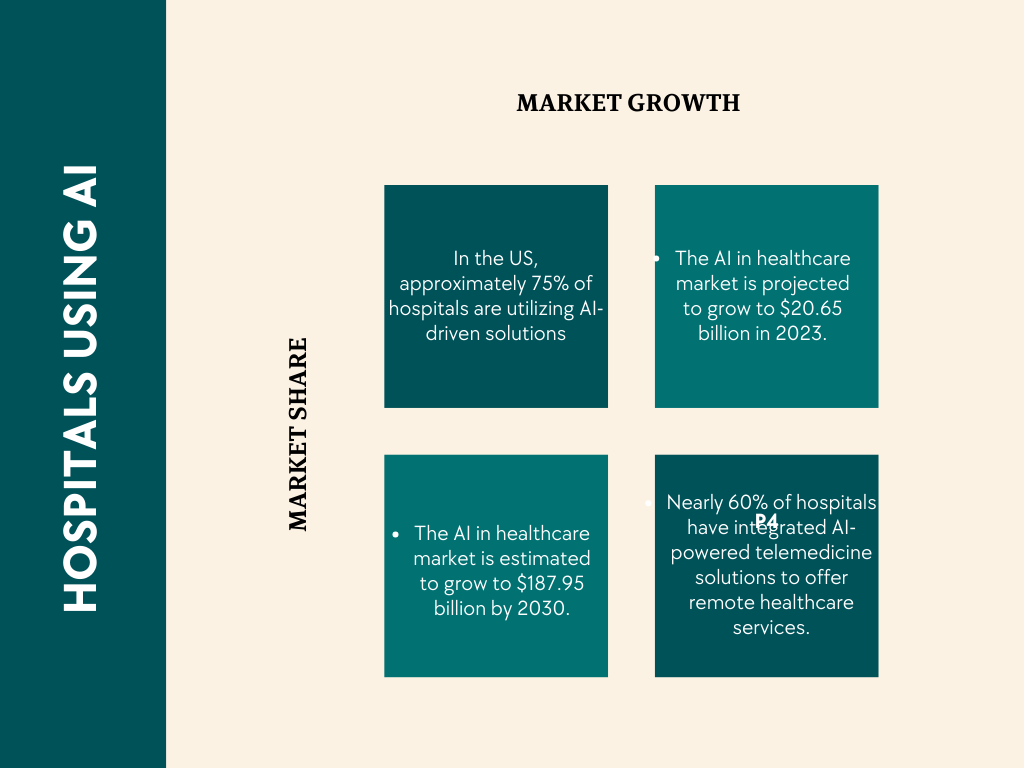
AI's integration into the healthcare sector is experiencing a swift surge, and the numbers vividly illustrate this trend. Grand View Research's findings underscore this, revealing that the worldwide AI in healthcare market reached a value of USD 4.9 billion in 2020.
A crystal ball into the future, courtesy of MarketsandMarkets, predicts a robust trajectory with an anticipated compound annual growth rate (CAGR) of 41.4% by 2025.
What percentage of hospitals in the U.S. have adopted AI?
As of 2024, the adoption of artificial intelligence (AI) in U.S. hospitals has seen significant growth. Approximately 65% of hospitals have implemented AI-assisted predictive models, primarily to forecast inpatient health trajectories (92%), identify high-risk outpatients (79%), and facilitate scheduling (51%).
Despite this widespread adoption, there is a notable gap in evaluating these AI tools for potential biases. While 61% of hospitals assess their predictive models for accuracy, only 44% conduct evaluations for bias. Larger, better-funded hospitals that develop their own models are more likely to perform these evaluations compared to under-resourced hospitals relying on external models.
Additionally, a survey by the American Medical Association indicates that 66% of physicians reported using healthcare AI in 2024, marking a 78% increase from 2023. This surge reflects growing physician interest in leveraging AI to enhance patient care and streamline administrative tasks.
Sources : [ American Medical Association School of Public Health ]
What Percentage Of Hospital Use AI in 2023?
According to the latest data, 52% of global hospitals report using AI technologies in various capacities.
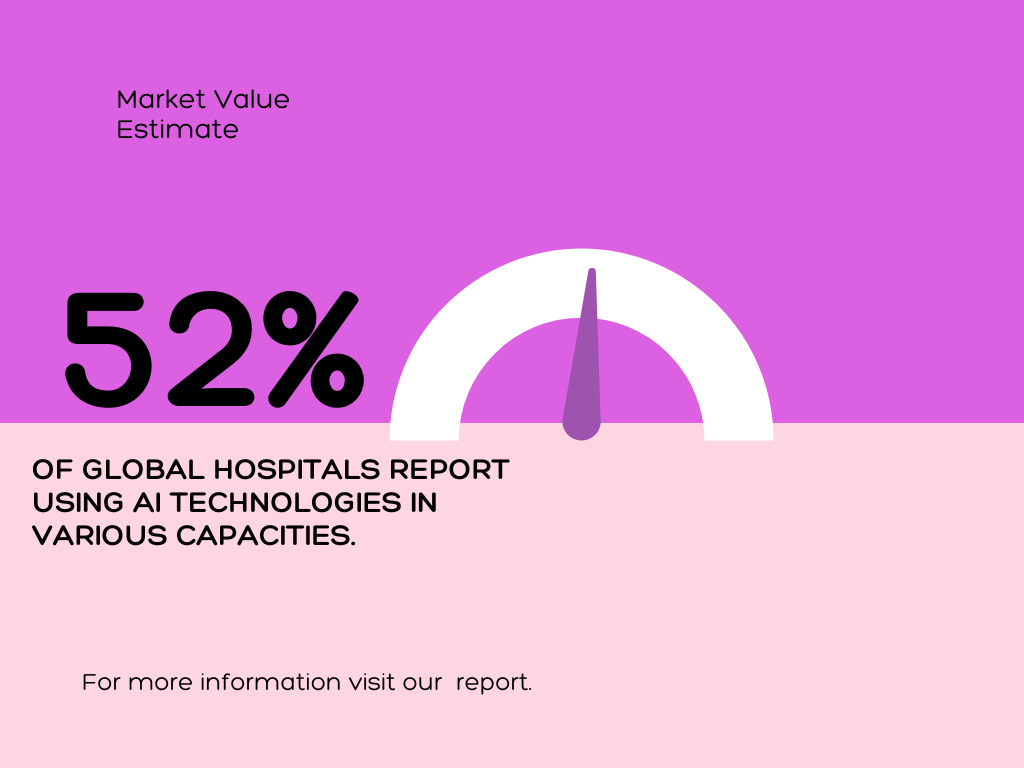
A significant portion of hospitals worldwide, estimated to be around 40%, are actively exploring the integration of AI into their operations.
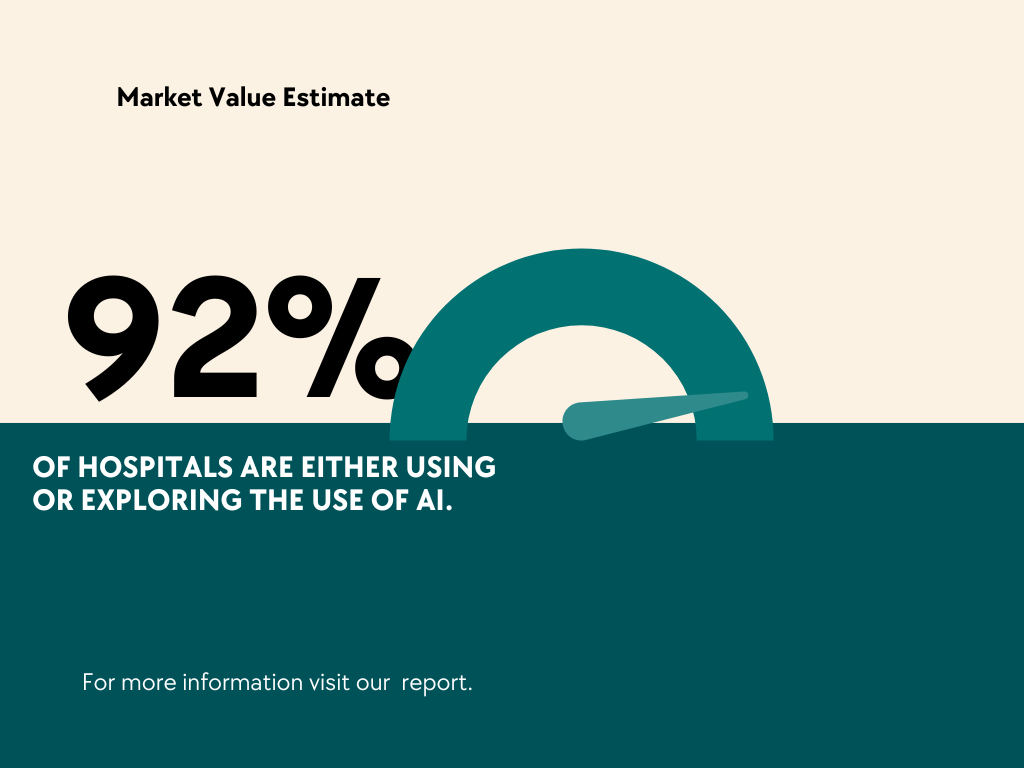
That means that over 92% of hospitals are either using or exploring the use of AI.
This statistic is a powerful indicator of the growing importance of AI in healthcare. It shows that the market for AI in healthcare is rapidly expanding, and that more and more organizations are investing in this technology.
This statistic is a clear sign that AI is becoming an increasingly integral part of healthcare, and that it is here to stay.
Which countries have the highest AI adoption rates in hospitals?
Artificial intelligence (AI) adoption in healthcare varies significantly across countries, influenced by factors such as technological infrastructure, investment levels, and policy support. Below is an overview of AI adoption rates in hospitals across different nations:
United States
The U.S. leads in AI healthcare revenue, with figures reaching approximately $11.8 billion in 2023. Projections indicate a substantial growth to $102.1 billion by 2030, reflecting a compound annual growth rate (CAGR) of 36.1%.
China
China demonstrates a rapid integration of AI in healthcare. For instance, DeepSeek, a Hangzhou-based startup, has seen its language models widely adopted across various sectors, including hospitals. Implementations encompass diagnostic tools and digital nurse assistants, underscoring the government's strong support for AI initiatives.
India
Indian hospitals are increasingly investing in AI to enhance operational efficiency. Apollo Hospitals, for example, plans to increase AI investments to automate routine tasks such as medical documentation, aiming to alleviate staff workload and improve patient care.
South Korea
South Korean hospitals are recognized for their advanced AI integration. Inha University Hospital has been acknowledged globally for its AI applications, with other institutions like Seoul National University - Bundang Hospital also earning top rankings. These hospitals excel in adopting cutting-edge AI technologies to enhance patient care and medical research.
Europe
In the European Union, AI adoption in healthcare is progressing. As of 2021, 42% of healthcare organizations reported using AI technologies for disease diagnosis.
Asia-Pacific Region
Clinicians in the Asia-Pacific region report the highest prevalence of AI usage, with nearly 30% incorporating AI into their work.
Sources [ Statista AIPRM Brand Finance Reuters Financial Times]
How much are hospitals investing in AI technology?
In recent years, the healthcare sector has witnessed substantial investments in artificial intelligence (AI) technologies, reflecting a commitment to enhancing patient care and operational efficiency. Below are insights into the magnitude of these investments and the primary AI technologies that hospitals are prioritizing:
Over the past decade, there has been a significant surge in financial commitments toward AI in healthcare:
In the United States, venture capital investments in health AI are projected to reach $11 billion in 2024, contributing to the broader $4.5 trillion U.S. healthcare market.
Globally, healthcare AI startups have attracted approximately $60 billion over the last ten years, with more than $30 billion invested in the past three years alone.
Sources [ American Hospital Association World Economic Forum ]
What are the top AI technologies hospitals are investing in?
Hospitals are channeling investments into various AI-driven solutions to address clinical and operational challenges:
Diagnostic Imaging and Patient Diagnostics: AI applications in diagnostic imaging have garnered significant attention, with healthcare AI companies focusing on patient diagnostics accounting for 52% of total AI investments in clinical solutions.
Administrative Efficiency: Institutions like Apollo Hospitals in India are investing in AI to automate routine tasks such as medical documentation, aiming to reduce the workload of medical staff and enhance overall efficiency.
Predictive Analytics: AI-powered databases are being utilized to expedite drug discovery processes, as demonstrated by researchers at the Oxford Drug Discovery Institute who have leveraged AI to filter extensive biomedical data more efficiently.
Sources [ WSJ Reuters Fierce Healthcare ]
How many hospitals use AI-powered chatbots for patient communication?
The integration of artificial intelligence (AI) chatbots into healthcare has seen significant growth, particularly in enhancing patient communication. As of 2023, approximately 46% of medical practices have implemented chatbots on their websites to assess patient symptoms and determine the necessity of immediate medical attention.
These AI-powered chatbots are primarily utilized for administrative tasks, including appointment scheduling, prescription refill requests, and providing access to medical history. Specifically, 72% of practices use chatbots for scheduling, 66% for handling prescription refills, and 63% for delivering requested patient data.
The adoption of AI chatbots has demonstrated tangible benefits for healthcare providers. A notable 68% of practices report a positive return on investment from chatbot integration. Furthermore, 55% of practices utilizing chatbots for patient self-scheduling have saved at least an hour per week, allowing medical staff to allocate more time to complex patient care tasks.
Looking ahead, the role of AI chatbots in patient treatment is expected to expand. A survey revealed that 77% of doctors believe AI-powered chatbots will be capable of safely treating patients within the next decade.
Despite the growing implementation of AI chatbots, patient comfort with AI-generated medical information remains cautious. A 2023 study indicated that only 10% of U.S. patients feel comfortable with AI-generated diagnoses, underscoring the necessity for ongoing trust-building and transparency in AI healthcare technologies.
Sources [ Coherent Solutions Press Release ]
How the Healthcare AI landscape looks as of December 2022
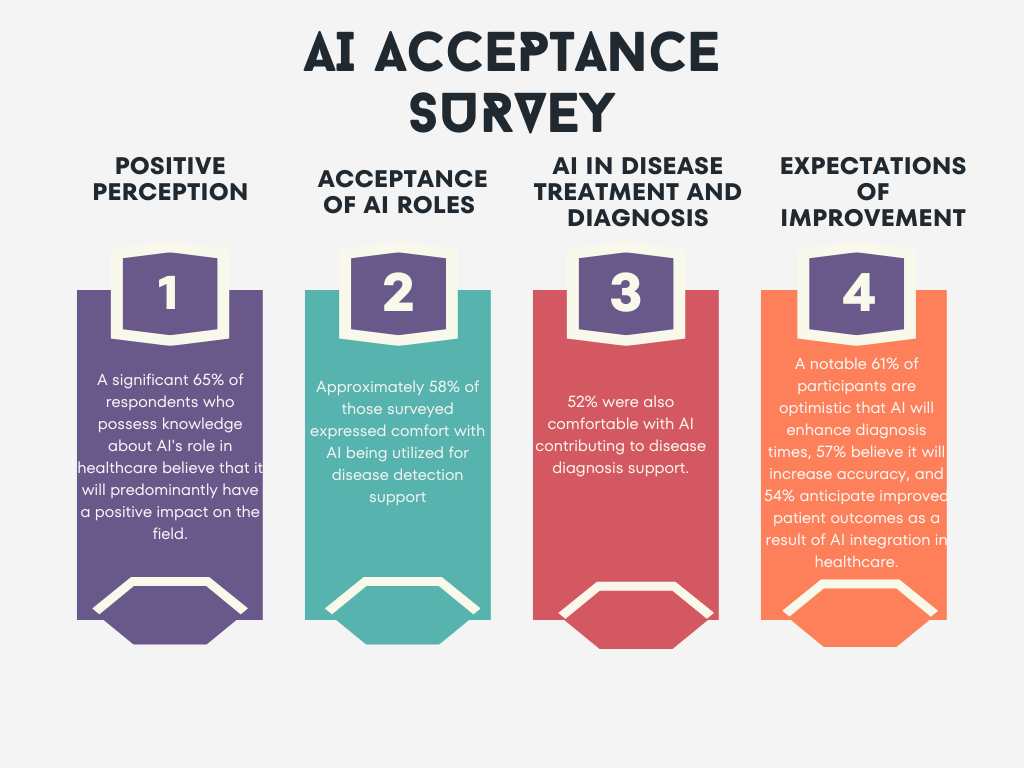
In a recent poll conducted by Morning Consult, insights from 2,200 adults were gathered, with a margin of error of ±2%. The key findings are as follows:
- Positive Perception
A significant 65% of respondents who possess knowledge about AI's role in healthcare believe that it will predominantly have a positive impact on the field.
- Acceptance of AI Roles
Approximately 58% of those surveyed expressed comfort with AI being utilized for disease detection support, while 57% were open to AI assisting in administrative tasks within healthcare settings.
- AI in Disease Treatment and Diagnosis
More than half of the respondents (53%) indicated comfort with the use of AI in disease treatment support, and 52% were also comfortable with AI contributing to disease diagnosis support.
- Expectations of Improvement
A notable 61% of participants are optimistic that AI will enhance diagnosis times, 57% believe it will increase accuracy, and 54% anticipate improved patient outcomes as a result of AI integration in healthcare.
Health care spending on AI software is expected to grow 40% in 2023, from $4.4 billion in 2022 to nearly $6.2 billion in the new year, according to Omdia forecasts.
However, the poll also uncovered certain reservations among Americans regarding AI in healthcare.
These concerns present areas of focus for medtech companies and policymakers as they navigate the implementation of AI in healthcare systems.
The reservations extend to AI's involvement in robotic surgery, primary care, virtual nursing assistants, and specialty care, suggesting the need for thoughtful consideration and transparent communication as AI continues to shape the future of healthcare.
Also read; Medical Errors Facts & Statistics in Healthcare
Challenges and Considerations for AI Adoption
As healthcare organizations increasingly embrace the potential of artificial intelligence (AI) in healthcare, they encounter a unique set of challenges that require careful consideration.
These challenges encompass ethical and regulatory aspects specific to the healthcare domain.
Among the most critical challenges are:
- Data Privacy and Security
AI systems in healthcare often handle vast amounts of personal health information. Safeguarding this data is paramount to prevent misuse. Robust data privacy measures must be implemented to protect patients' sensitive information from potential exploitation.
- Patient Safety and Accuracy
AI systems must be meticulously trained to recognize intricate patterns in medical data, understand the complex relationships between various diagnoses and treatments, and provide highly accurate recommendations tailored to each individual patient. Ensuring the safety and well-being of patients is a top priority.
- Algorithm Training
Training AI algorithms in healthcare is a complex task. It involves teaching the system to make sense of intricate medical data, which can be challenging due to the variability and complexity of healthcare information.
- Integration with Existing IT Systems
Integrating AI seamlessly with existing healthcare IT systems can pose significant challenges. A deep understanding of existing technology is essential to ensure smooth interoperability and minimize disruption to medical providers.
- Physician Acceptance and Trust
For AI to thrive in healthcare, it must gain the acceptance and trust of medical professionals. Physicians need to have confidence that AI systems provide reliable advice and adhere to the latest medical research. Transparency in AI decision-making processes is crucial to build this trust.
- Regulatory Compliance
Adherence to federal regulations is paramount to ensure ethical AI usage in healthcare. Stricter guidelines and regulations are essential to safeguard patient safety and prevent AI from compromising healthcare standards.
Healthcare AI Players
1) Google Health/DeepMind
In 2019, DeepMind's healthcare team joined forces with Google Health with a shared vision of creating products that support healthcare teams and enhance patient outcomes. Google Health has been actively harnessing the potential of artificial intelligence (AI) in various healthcare applications, including breast cancer screening, outcome prediction, and preventing vision impairment.
What sets Google Health's efforts apart is their tangible results. Collaborating with DeepMind, they developed an AI-powered solution for the detection of breast cancer. Remarkably, this algorithm demonstrated exceptional performance by surpassing the diagnostic accuracy of human radiologists. On average, it outperformed them by an impressive margin of 11.5%.
This accomplishment highlights the practical impact AI can have in healthcare. It signifies that AI technologies have the potential not only to match but also to exceed human capabilities in critical medical tasks like early disease detection. This progress is a testament to the significant strides being made in the integration of AI into healthcare, promising improved patient care and better health outcomes in the future.
Augmedix
Augmedix, a medical documentation specialist, has developed innovative solutions to streamline the process of extracting vital information from natural conversations between physicians and patients. This technology instantly converts these interactions into real-time medical notes, which are automatically integrated into the Electronic Health Record (EHR) systems used by healthcare providers.
The significance of Augmedix's work lies in its ability to address the administrative burdens that often weigh down healthcare professionals. By automating these documentation tasks, it not only saves valuable time but also has the potential to mitigate burnout symptoms experienced by medical personnel.
Their recent announcement introduces "Chart prep," a new service equipped with technology that prepares a structured patient note and relevant content for physicians. This preparation is tailored to the specific type of visit and the patient's previous medical records. As a result, physicians can efficiently review this information before meeting with the patient. The data gathered includes patient demographics, medication changes, current medical history, imaging and lab results, immunization records, as well as past medical, family, and social history.
This advancement marks a significant step toward optimizing healthcare workflows by reducing manual documentation tasks, allowing physicians to focus more on patient care and less on administrative duties. It underscores the potential of technology to enhance the efficiency and effectiveness of healthcare delivery while alleviating the strain on medical professionals.
Butterfly Network
In 2011, Jonathan Rothberg founded his startup, Butterfly Network, with an ambitious mission: to create an innovative handheld medical imaging device that could revolutionize the accessibility and cost-effectiveness of MRI and ultrasounds while also automating aspects of the medical imaging process.
The flagship product of Butterfly Network, the Butterfly iQ, represents a significant step towards achieving this vision. This portable handheld device leverages cutting-edge Ultrasound-on-Chip technology, a breakthrough that replaces the traditional transducer system with a single silicon chip. What's remarkable is that this single chip can emulate various types of transducers, including linear, curved, or phased ones. This innovation enables comprehensive whole-body imaging using just one probe.
By integrating semiconductors, artificial intelligence, and cloud technology into a pocket-sized device, the Butterfly iQ has transformed the landscape of remote medical imaging. It has made it possible for medical professionals to conduct imaging procedures remotely, which is particularly beneficial for underserved and remote communities. For some of these communities, access to such crucial medical information has become a reality for the first time, marking a significant advancement in healthcare accessibility and technology's role in bridging gaps in medical services.
Arterys
Arterys, a pioneering startup, operates at the intersection of cloud technology, artificial intelligence, and medical imaging, aiming to revolutionize the field by bringing the power of the cloud to medical imaging.
Their cutting-edge platform, which has received FDA clearance, harnesses the capabilities of deep learning AI. It is designed to expedite the process of radiology image analysis, significantly reducing the likelihood of missed detections by as much as 70%. Additionally, this technology automates routine tasks, thus freeing up valuable time for physicians. This newfound time can then be redirected towards delivering high-quality patient care, enhancing overall healthcare services.
What sets Arterys apart is its continuous accessibility as a 24/7, always-connected solution. This feature enables users to access critical patient data from any location worldwide, at any time. This global accessibility contributes to more efficient and effective healthcare delivery.
In a significant development, Arterys was acquired by Tempus Labs, a prominent player in precision medicine AI, in October 2022. This acquisition marks a milestone in the realm of imaging AI, underscoring the expanding applications of this technology beyond traditional radiology use cases. It signals the ongoing transformation of medical imaging and its increasing integration with advanced AI solutions.
Behold.ai
Behold.ai has developed an advanced software solution employing a deep learning model-based red dot algorithm. This innovative technology is capable of classifying chest X-rays (CXR) and pinpointing specific findings through the use of heatmaps. The AI system underwent rigorous training using a dataset of over 30,000 images, each meticulously reviewed by experienced UK-certified Consultant Radiologists. This extensive training process has resulted in an algorithm that achieves remarkable accuracy, exceeding 90%. Notably, this AI can swiftly detect abnormalities within a matter of seconds, showcasing its potential to expedite and enhance the diagnostic process in healthcare.
Atomwise
Based in San Francisco, Atomwise has a mission to revolutionize the field of medicine development by leveraging supercomputers to predict, in advance, the effectiveness of potential medicines. Their cutting-edge technology, known as AtomNet, harnesses the power of convolutional neural networks, an AI technology akin to what drives self-driving cars and enables voice recognition on your phone.
AtomNet's capabilities are derived from an extensive database containing molecular structures. It draws insights from millions of experimental affinity measurements and thousands of protein structures. By doing so, AtomNet can forecast how small molecules bind to proteins, thus identifying promising and safe drug candidates.
Notably, Atomwise entered into a substantial $1.2 billion research collaboration with Sanofi in August 2022. This partnership focuses on utilizing the AtomNet platform to explore small molecules targeting up to five specific drug targets. The platform's incorporation of deep learning for structure-based drug design empowers it to conduct rapid AI-driven searches within Atomwise's vast proprietary library, which contains over 3 trillion synthesizable compounds. This innovative approach has the potential to significantly reduce the costs and time associated with drug development, opening doors to more efficient and effective medicines in the future.
Recursion Pharmaceuticals
Established in 2013, Recursion is a pioneering drug discovery company that embarked on a mission to develop a proprietary drug discovery platform. This platform seamlessly integrates high-throughput biology and automation with cutting-edge AI technologies. Notably, the company has achieved a remarkable milestone by imaging tens of billions of human cells and accumulating an extensive dataset exceeding 19 petabytes of biological data to fuel their AI-driven endeavors.
Recursion's distinctive approach combines computer vision with classical machine learning techniques and neural networks. This synergy enables the company to execute approximately 2 million experiments each week. Through this rigorous process, Recursion's algorithm has the capability to unveil new drug candidates, elucidate mechanisms of action, and identify potential toxicity concerns. These insights have the potential to pave the way for the development of innovative and effective treatments for patients, highlighting the transformative power of AI in the realm of drug discovery.
Diabeloop
Diabeloop stands as a significant player in the realm of therapeutic AI, specifically in the context of insulin delivery for managing type 1 diabetes. Their innovative solution is designed to automate and personalize insulin treatment, determining the precise insulin doses required by patients throughout the day.
In 2022, the company unveiled the outcomes of an extensive 12-month data collection study involving 4,162 patients distributed across Germany, Italy, Spain, The Netherlands, and Switzerland. This study showcased impressive results, indicating a noteworthy improvement in "time-in-range" metrics by 17.6% over the course of one year in real-world settings. Equally important, patients experienced less than 20 minutes per day in hypoglycemia, addressing a critical concern associated with low blood sugar levels. These findings underscore the potential of AI-driven solutions like Diabeloop to enhance the management and quality of life for individuals living with type 1 diabetes.
Conclusion
So, there you have it – hospitals are getting a serious tech upgrade with AI, making healthcare smarter, faster, and more patient-centric.
For more related content, take a look at 10 Case Studies: Hospitals Embracing AI and Highest Paying Healthcare tech Jobs (2023 Data). Best Children's Hospitals In Saskatchewan


